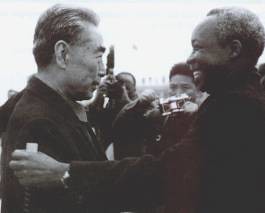
Chou En-lai former Chinese Premier along with former President of Tanzania, Mwalimu Julius Nyerere. Nyerere understood the land question in Zimbabwe., a photo by Pan-African News Wire File Photos on Flickr.
‘It’s time for Africa to salute liberator Nyerere’
Sunday, 23 February 2014 00:00
Kuda Bwititi
Zimbabwe Sunday Mail
President Mugabe has called on fellow African leaders to honour Tanzania’s founding President, Mwalimu Julius Nyerere, saying it was embarrassing that such a revered figure is not getting the recognition he deserves for the immense contribution he made to the liberation of many African
states.
Speaking at a birthday party hosted for him by staff of his office at State House yesterday, the President said African leaders should do more to honour Dr Nyerere, who supported liberation movements by making his country a sanctuary for freedom fighters.
Cde Mugabe, who is the African Union Deputy Chair, said he would strongly advocate Dr Nyerere’s recognition.
“I want to say, when all honour has been showered on heroes in Africa, the man who has been humiliated is Mwalimu Julius Nyerere. There we are, liberation movements, there we were - depending on the resources in Tanzania. But there has been nothing said about this man and his country at the OAU. Nkrumah, yes, he had that support … But Tanzania, to say Nyerere was like any other.
“I want us, Zimbabweans, to stand for Nyerere. Africa should be reminded of the responsibility that it thrust on this man, a burden to train all liberation movements. It was a burden that was not only political, but, at the end of the day, there is no one to say Tanzania deserves to be mentioned.
“At the end of the day, there is no one to say Tanzania deserved to be even mentioned, just mere mentioning as having accomplished that mission, that mission to have us as friends, that mission to make us train our liberation movements in Africa.
“We all went in various ways, in various dimensions, to Tanzania to liberate our countries and we have not gone back to Tanzania. Well, I am going to be chair of the AU and I am going to tackle this issue,” he said, drawing applause from guests at the function.
President Mugabe said Zimbabwe, which upholds the spirit of Africanness, should take the lead in expressing gratitude to President Nyerere.
“There is none, none, none, none, none at all who have recognised what Nyerere did. Just look at the nature of the mission he undertook. He never changed at all and we were all there. We of Zimbabwe are not ungrateful, we are not ingrates. We are a grateful nation and we shall undertake to honour this man,” he said.
President Mugabe said Zimbabwe’s service chiefs received military training in Tanzania and would not be removed from their posts as they have executed their duties diligently.
“Maservice chiefs amurikuwona ayo, hanzi security sector reform, security sector reform? Unoreformer ivava kuti vave chii? What do you want to clean out of excellence? You look at (Zimbabwe National Army Commander Lieutenant-General Phillip Valerio) Sibanda uyu. He was a United Nations commander at one time.
“Then zvononzi reform and you can’t reform excellence. I have stuck to them because I know them. I know their loyalty, loyalty not just to me, but to the country, their givenness.
I remember at one time ndakaenda naChiwenga (Zimbabwe Defence Forces Commander General Constantine) kuLibya and he was very young. Takamiswa ikoko naGaddafi, you know, during the struggle and we came with nothing.
President Nyerere was born on April 13, 1922 and led Tanzania as its founding President in 1964 until he retired in 1985. He died in 1999.
His philosophy sought to make Tanzania a self-reliant nation free from indebtedness to former colonial powers and the entire Western bloc.
He was also adamant that colonialism and capitalism were responsible for the subjugation of Africans. The West, however, attempted to undermine his socialist ideas by accusing him of collapsing Tanzania’s economy.
A devout Catholic, he often fasted and lived a humble life by not enriching himself at his nation’s expense. He is often referred to as the Father of Southern Africa’s liberation as he was a die-hard supporter of the freedom of African states and also one of the founding fathers of the Sadc.
When Tanzania, which was then called Tanganyika, attained its independence in 1961, President Nyerere strongly believed that his own country’s independence would be meaningless if other African countries were not free.
He worked tirelessly in support of this goal for Zambia (1964), Malawi (1964), Botswana (1966), Lesotho (1966), Mauritius (1968), Swaziland (1968) and the Seychelles (1976).
When the other countries of Southern Africa were forced into wars of liberation to eventually achieve the same end, Tanzania provided political, material and moral support until independence and majority rule was achieved in 1975 (Mozambique, Angola), 1980 (Zimbabwe), 1990 (Namibia) and finally, 1994 (South Africa).
President Nyerere pursued the ideals of liberation, democracy and common humanity for the rest of the continent and with the leaders of the other few African countries that were independent in 1963, established the Organisation of African Unity (OAU), now the African Union, whose main objective was political liberation for the rest of the continent.
He was the first Chairman of the Frontline States, a body that was set up to support liberation movements in Southern Africa.
The leaders of the Frontline States met regularly from 1974-1994 to co-ordinate efforts, resources and strategies in support of the national liberation movements of Southern Africa that were fighting colonialism, racism and white minority rule.
No comments:
Post a Comment